It is critical for homeschooled students to have an understanding of their academic development. Sometimes, they may struggle with certain subjects while thriving in others. Since homeschooling allows for more individualized instructions, the report card for homeschooling offers a more personalized evaluation of academic growth. In contrast, a traditional report card presents a more standardized approach to grading and assessment. Whether at the elementary, kindergarten, middle, or high school level, a homeschool report card allows you to monitor your child’s academic growth and assess their strengths and weaknesses.
This can help you adjust your approach and teaching methods to cater to their individual needs. It can also provide insight into your child’s emotional well-being, personal development, and social experiences within the homeschool environment.
In this article, we will discuss the structure of a homeschool report card template and its benefits. We have also provided a wide collection of free and editable templates in Word and PDF formats for your convenience.
Free Templates
Given below are homeschool report card templates:
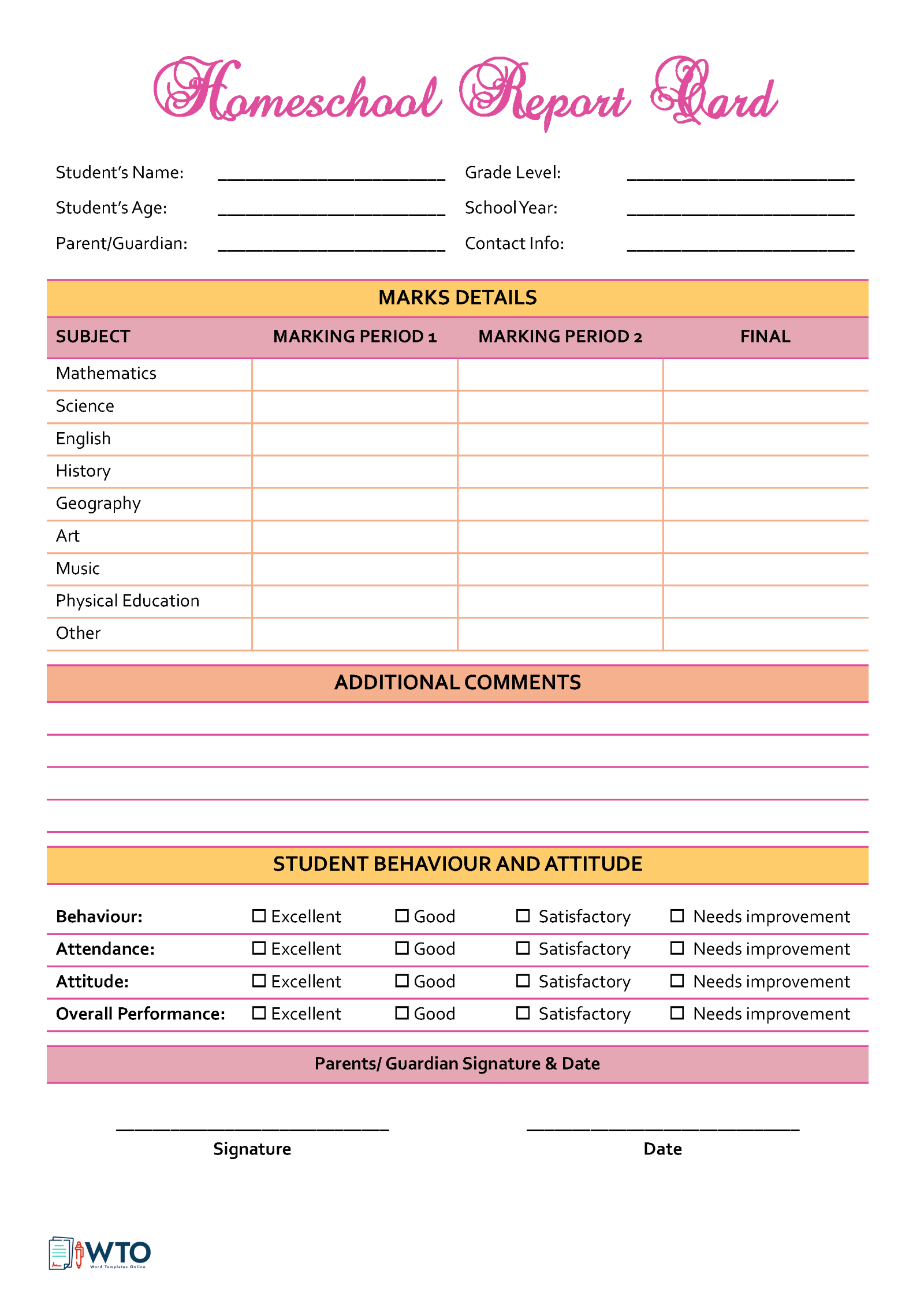
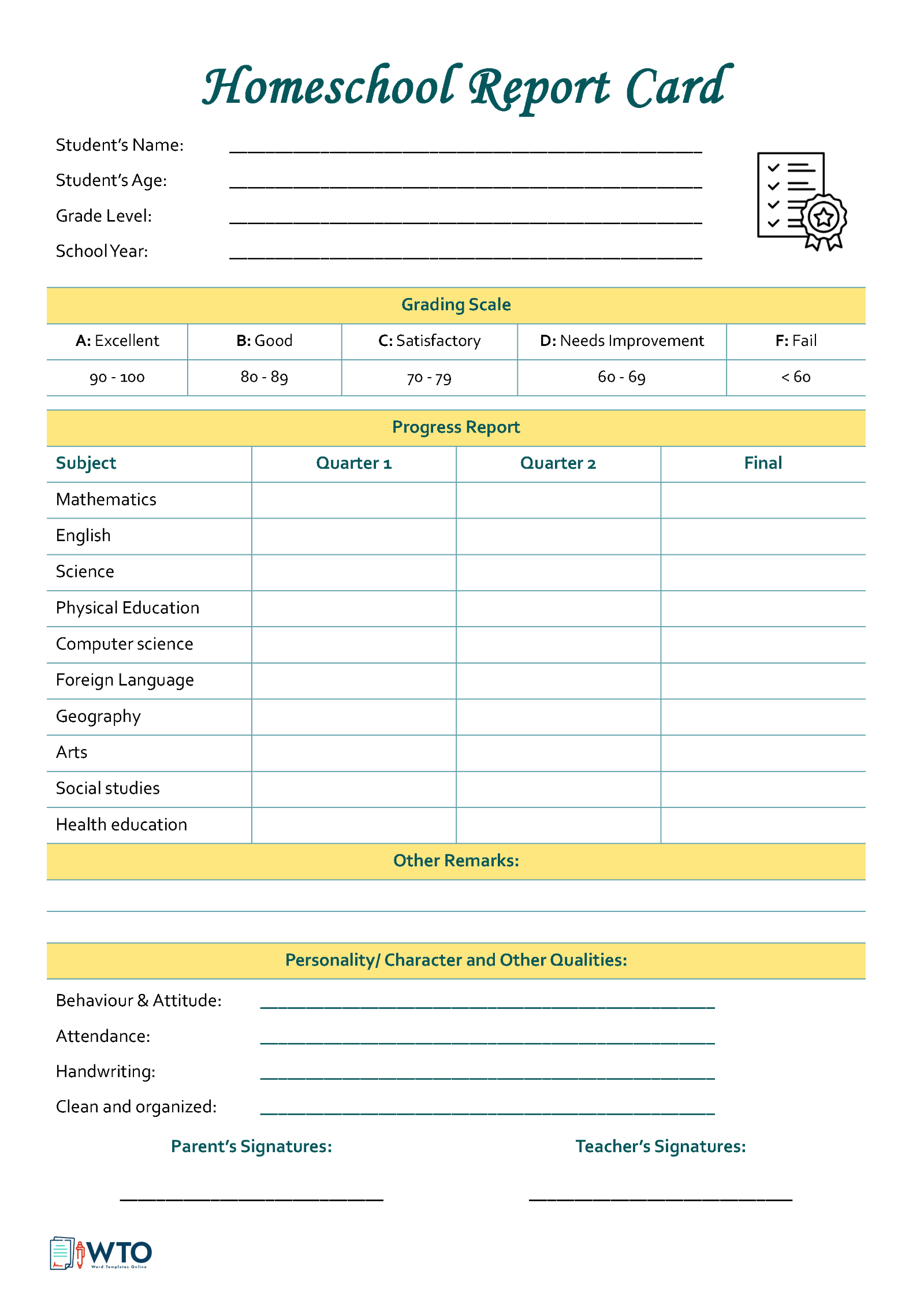
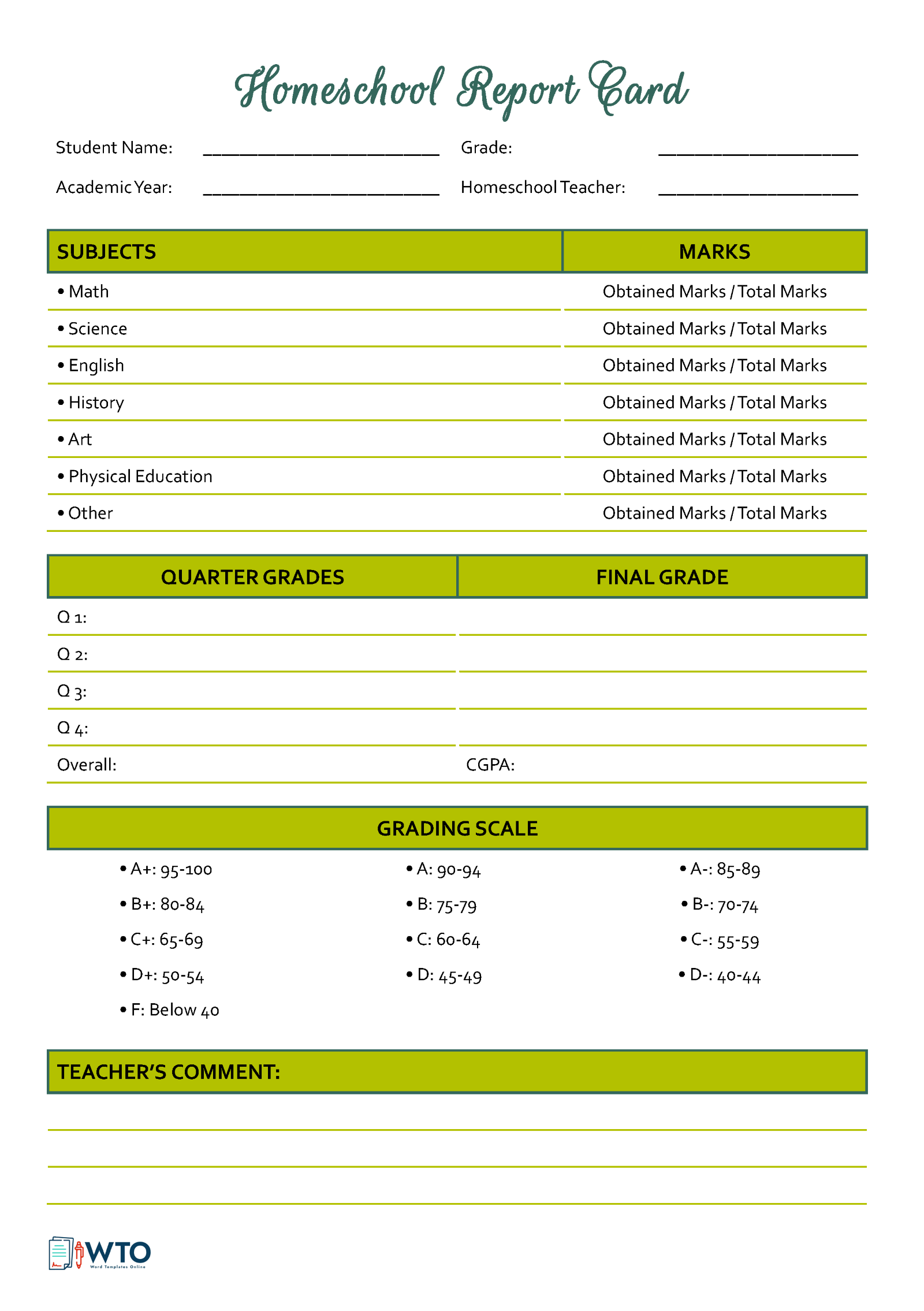
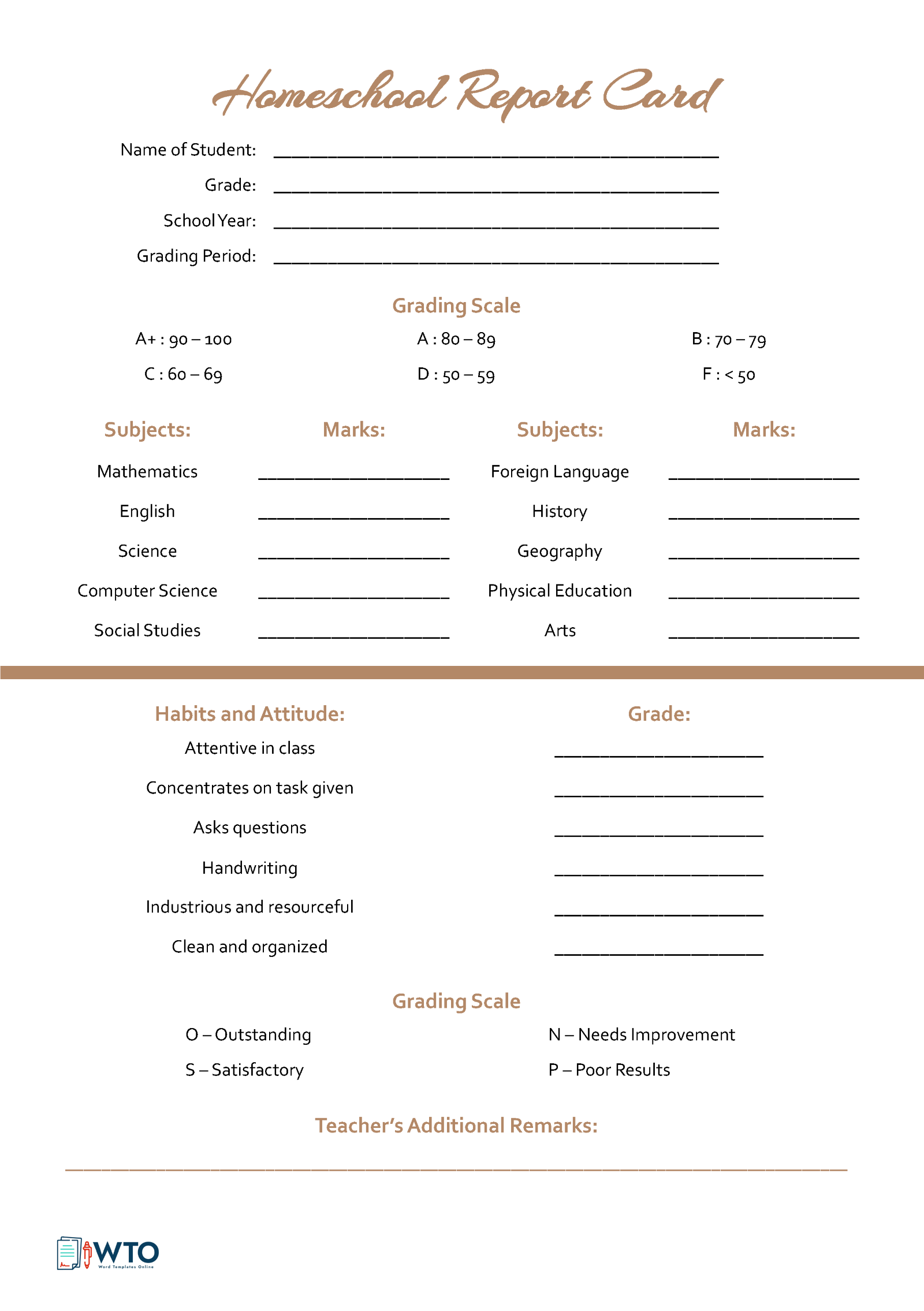
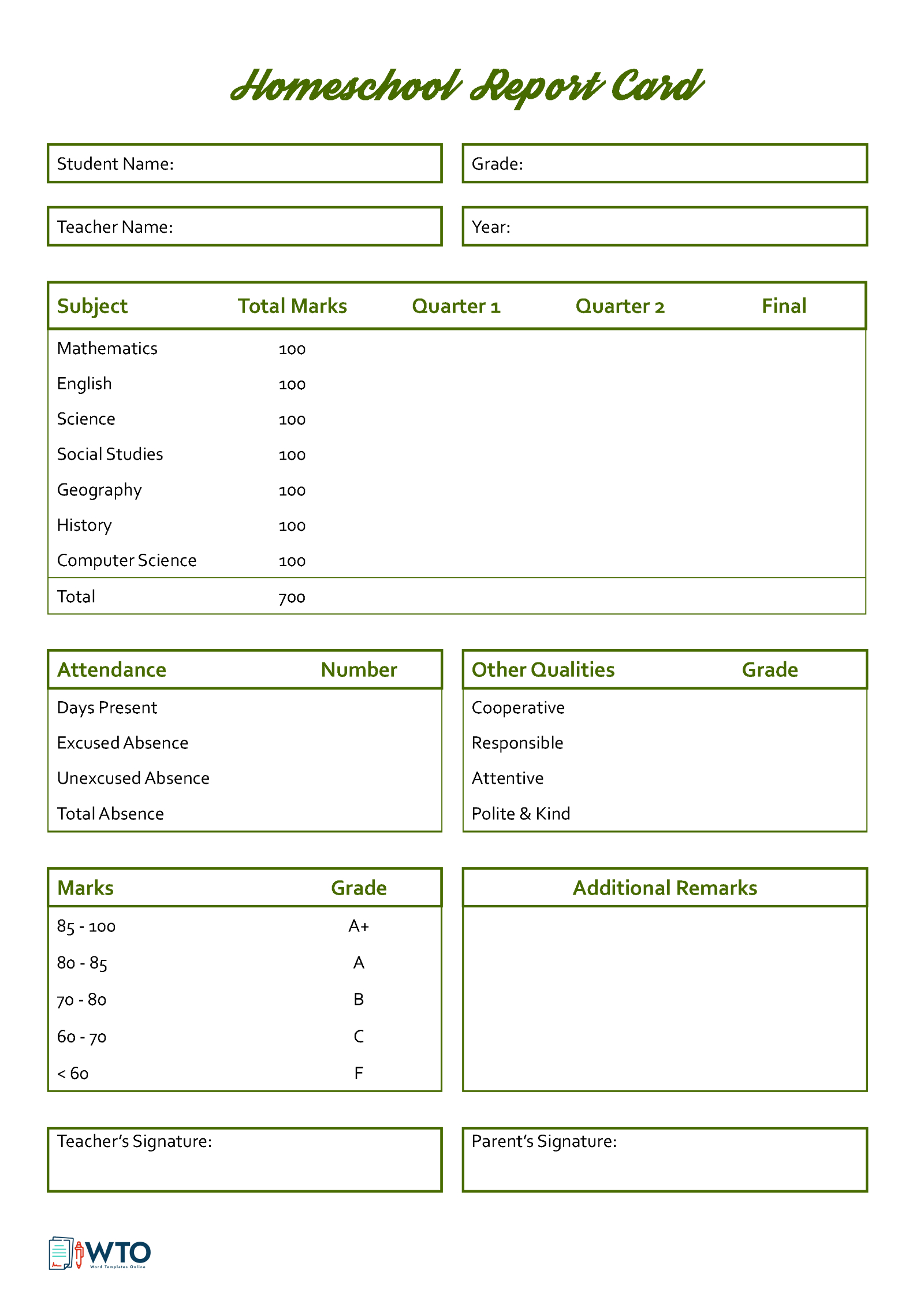
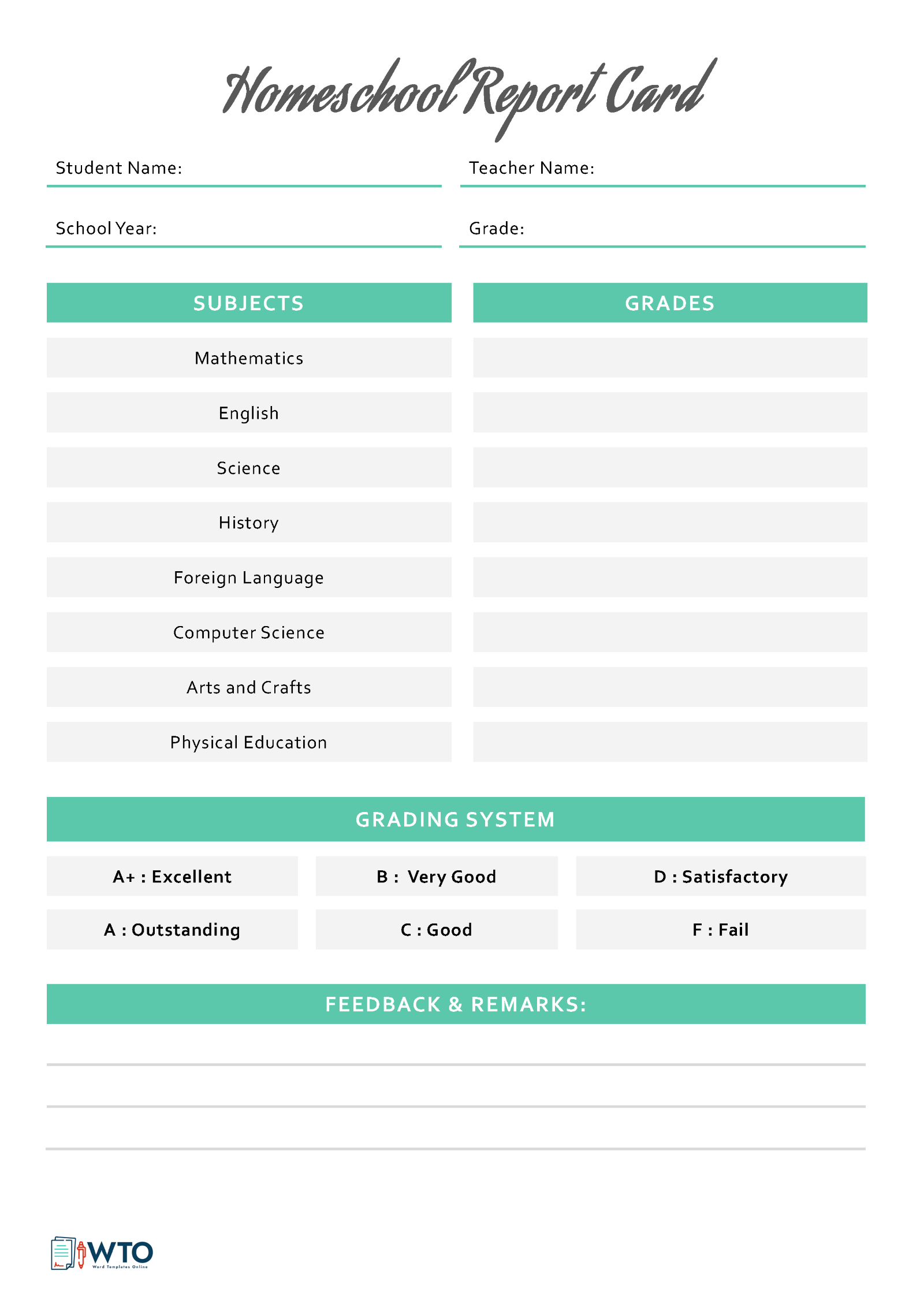
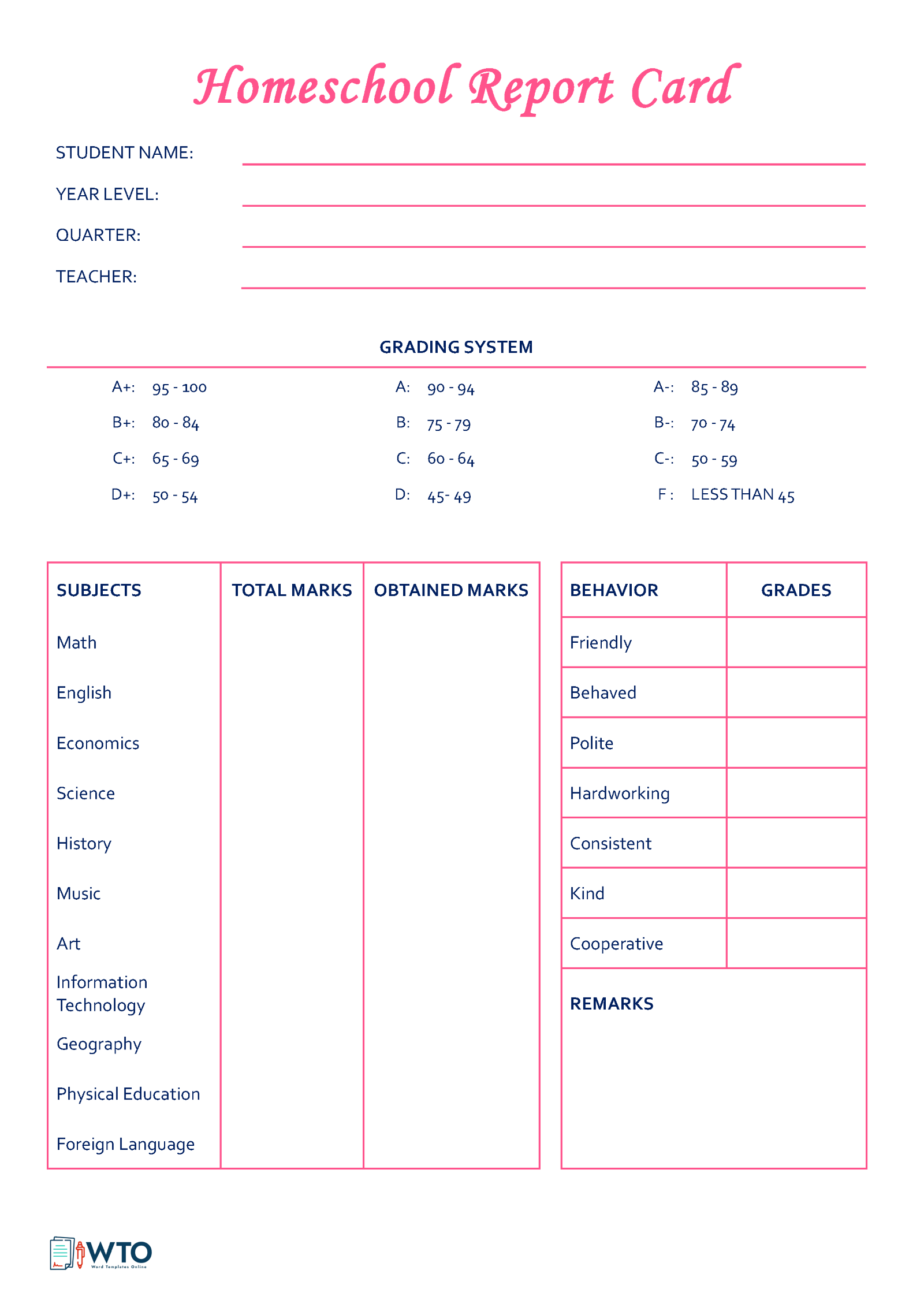
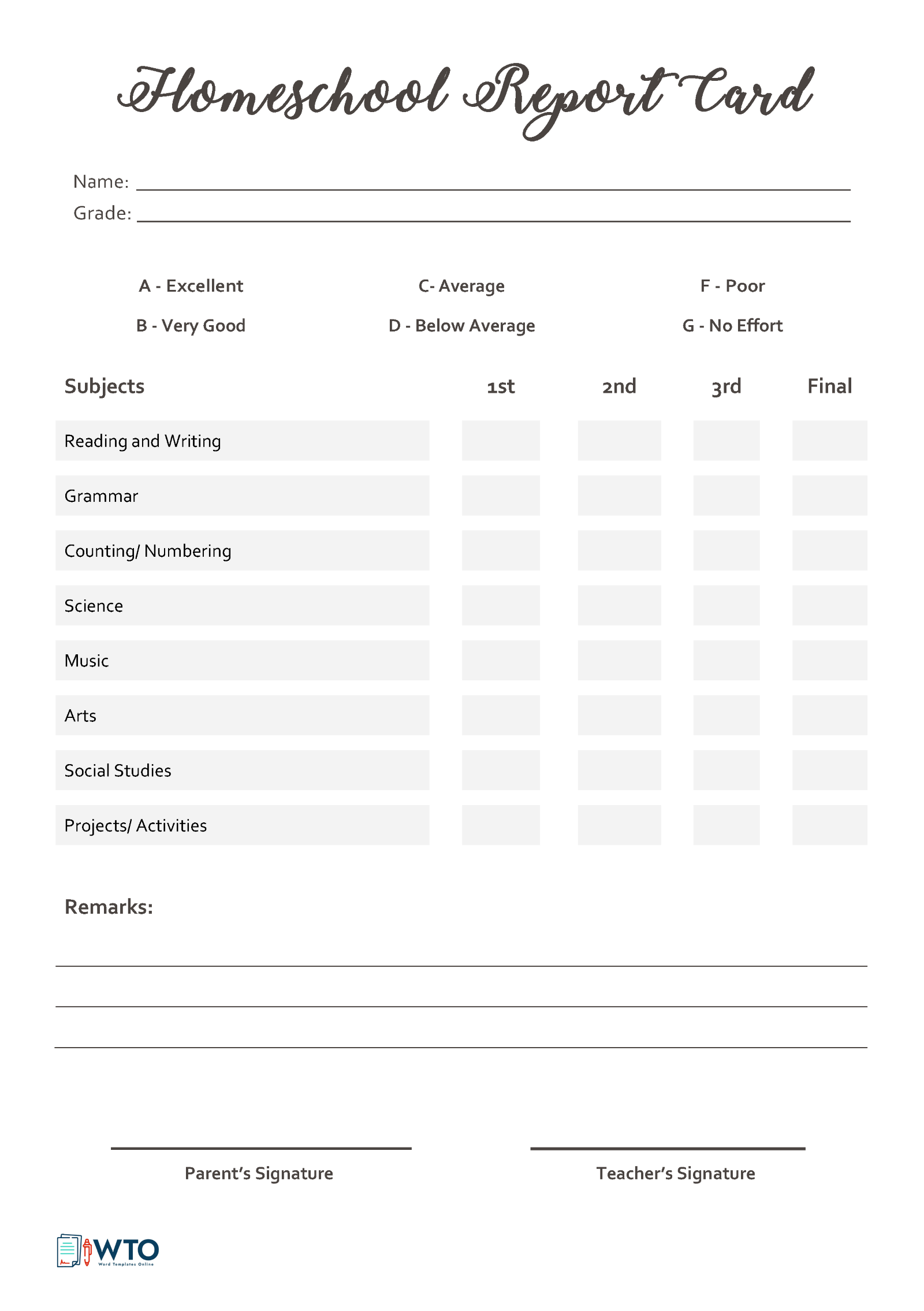
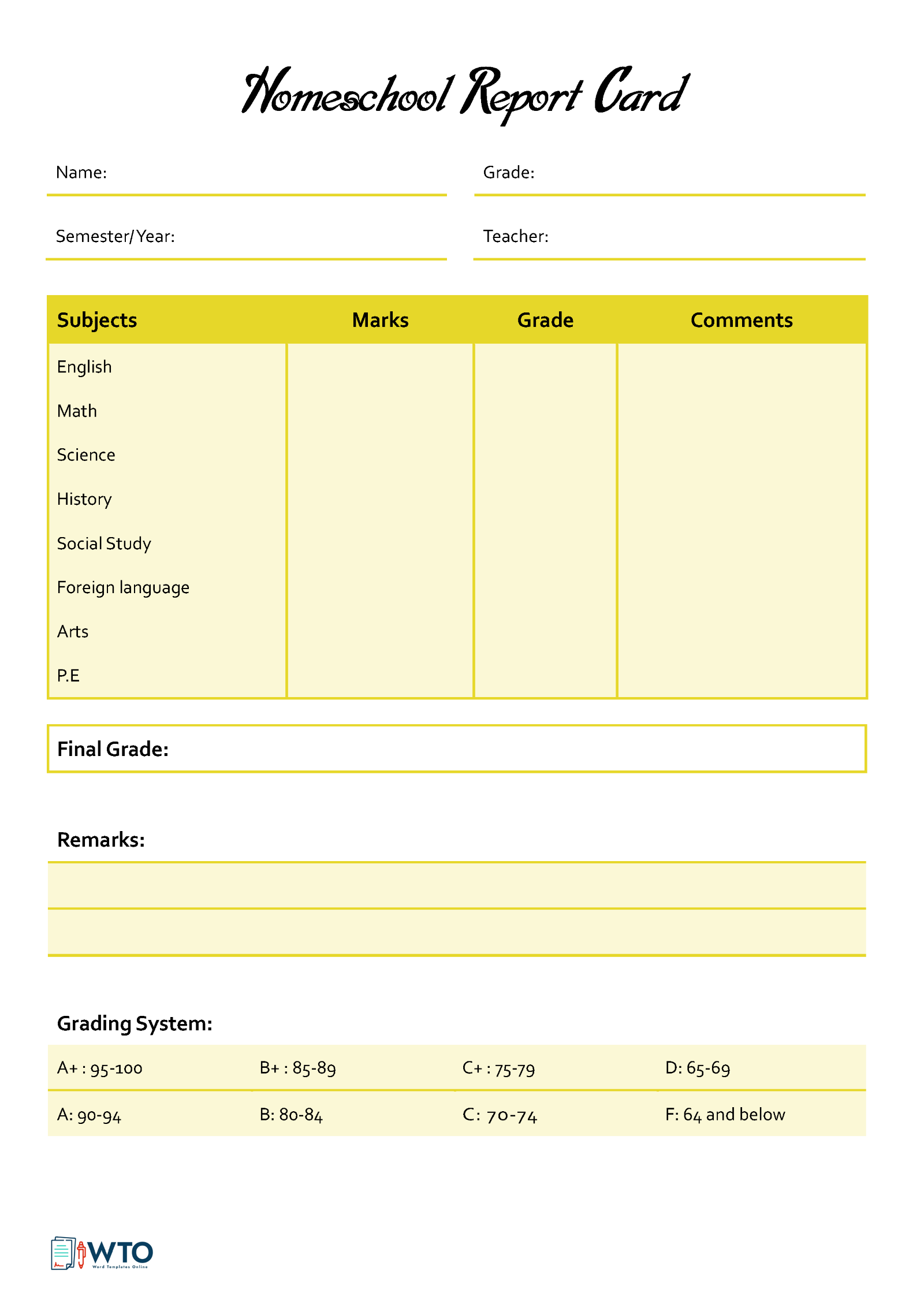
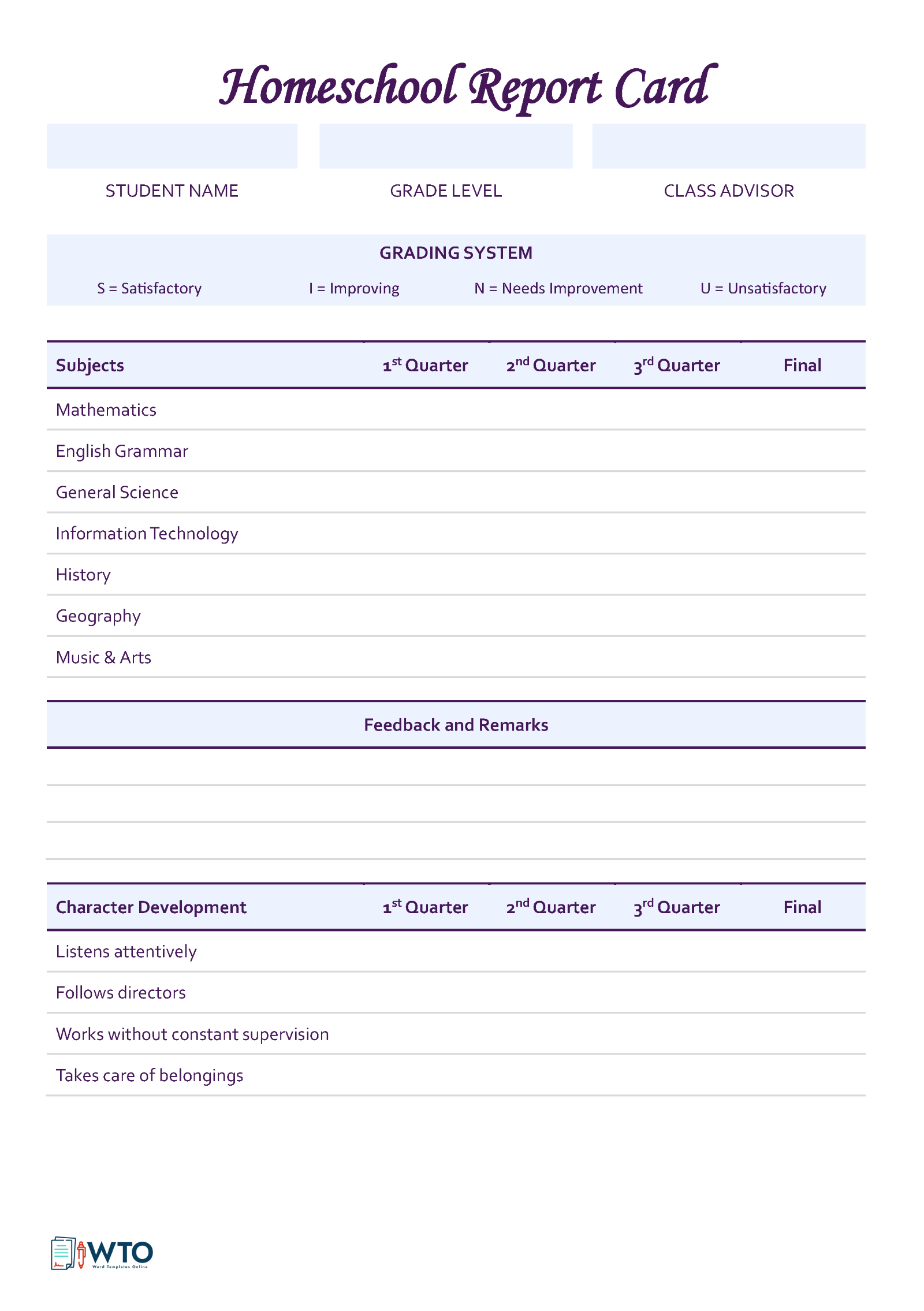
Structure of a Homeschool Report Card Template
In this section, we will address the major components of a well-structured template for a homeschool report card. Although the features of the template may vary based on your personal preferences and teaching approach, the features below tend to cut across:
Header
The first section of the template is a placeholder to include the name of your homeschool or education institution and its physical address. It also contains fields for the student’s name, grade, and current academic year to indicate the period covered by the report card. This information is beneficial, especially if you have more than one homeschooled student.
Contact information
The template has fields for specifying your details as the figure responsible for homeschooling. You can include your name and contact information, including your phone number and email address. Including contact details fosters open and seamless communication.
Academic subjects
The template has a table where you may list the subjects your child has studied during the homeschool year. These can include core subjects such as Math, Science, English, Social Studies, or History. You may also include electives such as Arts or any other specialized courses.
Grading scale and criteria
In this section of the template, you should define the grading criteria for the report card. You may use traditional letter grades, numerical grades, percentages, or alternative assessment approaches such as narrative evaluations. Provide a brief description of the scale used to assess the student’s performance in each subject.
Progress and grades
This section of the template is a table in which you can provide an overview of the student’s performance in each subject. Specify the subject name, assignment, quiz, and test scores and an overall grade for the homeschool period. You may also include a column for personal comments regarding your child’s performance in each subject.
Teacher’s comments
Allocate a section in the template where you can provide an overall summary of your child’s academic progress throughout the homeschool year. This may involve a general comment on their strengths, weaknesses, challenges, areas for improvement, and any notable achievements. You may also mention whether your child achieved the goals you set at the beginning of the homeschool year.
Extracurricular activities and achievements
Highlight any extracurricular activities your child has participated in during the homeschool year in this section. These may include sports, clubs, or community service events. You can document their accomplishments, any awards they received, and their overall experience outside the realm of academics.
Attendance record
Even though attendance record is optional, the template may include a section to record the student’s presence and absences throughout the academic year. This is because attendance and participation are evaluated differently in a homeschool setting as compared to traditional schools. Including this section enables you to assess your child’s engagement in the learning process.
Signature line
The final section of the template has blank spaces for your name and signature. By signing the report card, you acknowledge its accuracy and completion. It also reinforces the idea that education is a joint effort and encourages a sense of ownership over your child’s progress.
Benefits of Using a Homeschool Report Card Template
Apart from providing valuable insight into your child’s academic progress, a template for a homeschool report card accords numerous benefits. It allows you to adjust your curriculum and teaching methods to improve your child’s learning experience.
Let us explore the compelling reasons why using the template can improve the homeschooling experience:
Organization and consistency
A well-designed template provides a standardized framework to track your child’s academic journey. Sections for recording essential components such as subject grades, extracurricular activities, and comments are well-defined and presented consistently. This makes the report card uniform, allowing you to quickly review the progress of multiple students over a specific homeschooling period.
Clear assessment of academic progress
The template allows you to comprehensively assess your child’s academic performance throughout the homeschooling year. By documenting the grades for each subject, you can easily identify their strengths and weaknesses. This gives you a clear picture of how well your child is mastering the curriculum and helps you identify areas needing additional attention, support, or adjustments.
Communication tool between parents and students
Using a template presents opportunities for open and meaningful discussions between you and your homeschooled children. Your comments and feedback can provide a basis for improving the student’s academic performance. You may also issue constructive feedback, celebrate achievements, and address any concerns in a supportive manner. This strengthens your bond and encourages the students to be more proactive in their education.
Evaluating teaching methods and curriculum effectiveness
A template for a homeschool report card can help you evaluate the efficacy of your instructional methods. Monitoring your child’s academic progress closely can give you an insight into the impact of your teaching strategies. This personalized approach allows you to make changes where necessary. This continuous feedback ensures your curriculum is tailored to your child’s unique needs, learning style, and interests.
Final Words
A template for a homeschool report card is a valuable tool that can empower parents and educators who homeschool their children. It presents a structured framework for recording subject grades, notable achievements, strengths, weaknesses, and areas that require improvement. It also fosters honest and open communication between parents and homeschooled children, enhancing the overall academic experience.
With our well-designed templates, you can streamline the grading and assessment process. These resources can be customized and tailored to your child’s unique academic needs. They can be used at various academic levels, including elementary, kindergarten, middle, or high school. Simply download a template best suited to your needs and fill in the necessary details.








